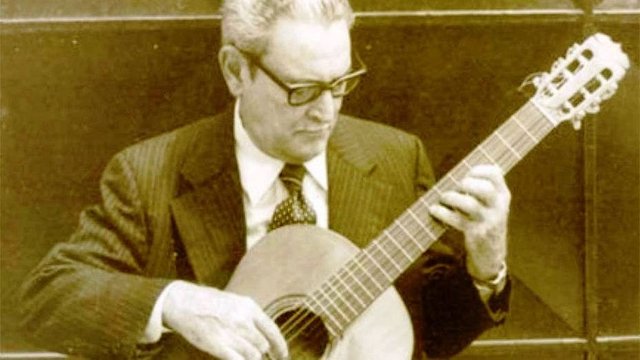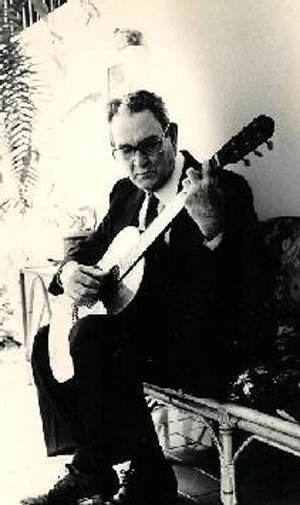The guitar is one of the most polifacetic instruments that exists. Being one of the most popular instruments in the world, it is not uncommon that every day someone tries to improve (or worsen) the way to play it. If we refer to a more specific branch, such as the Classical Guitar, or Academic Guitar, we can find such significant and important names as Andrés Segovia, Francisco Tárrega, Roland Dyens, Agustín Barrios Mangoré, among others. But it is in Venezuela, north of South America, where one of the most important composers and performers of modern classical guitar is born, that with his genius, raised the levels of Venezuelan music in such a way that his works are part of the obligatory repertoire of all guitarists worldwide: Antonio Lauro.

He was born in Ciudad Bolívar, capital of Bolívar state, one of the main states of the country, on August 3, 1917. Of Italian parents, he began his musical studies in Caracas, capital of the republic, at the age of 9 in the Academy of Music and Declamation, today Superior School of Music "José Ángel Lamas" where he was a disciple of Vicente Emilio Sojo, Juan Bautista Plaza and Raúl Borges, the latter, founder of the first chair of Classical Guitar in the country.
He was part of musical groups of great importance such as the "Orfeon Lamas" (1928) and the "Cantores del Trópico" (1935). He graduated in 1940 as a composer, and in 1954 he premiered, as lyrical singer, along with the Venezuelan Symphony Orchestra, the iconic piece of Venezuelan musical nationalism: the "Cantata Criolla" by Antonio Estévez, piece that was born from the poem "Florentino, the one that sang with the Devil. " During the fall of the dictator Marcos Pérez Jimenez, in 1948, he was imprisoned and exiled for his links to the political parties that opposed the dictator, spending almost a decade away from Venezuela, during that time he composed two of his most important works, the "Suite for Guitar" and the "Sonata for Guitar".

As a guitarist, he founded the famous "Trio Raul Borges" in 1945, together with Manuel Enrique Pérez Díaz and Flaminia Montenegro of DeSola. He composed numerous works for the instrument, especially waltzes, which led to the level of the greatest works for classical guitar. Unfailingly melodic and characterized by a distinctive syncopation (created by a hemiola in which two measures of 3/4 become a single measure of 3/2), such music was precisely the sort of folkloric raw material which Smetana, Bartók or Granados had elevated to the category of national art in Europe. His popularity increased worldwide when his works took an important place in the repertoire of four great masters: Andrés Segovia (Spain), John Williams (Australia-England), Leo Brouwer (Cuba) and Alirio Díaz (Venezuela) who was a great friend of Master Lauro and in 1980, soloist of the first recording of his "Concert for Guitar and Orchestra" with the Symphonic Orchestra of Venezuela. The greatest musical quality of these compositions was so great that John Williams called him "The Strauss of the Guitar". Additionally, Lauro's masterpieces have been the core of studies, workshops and Masters in Universities all around the World. He died in Caracas on April 18, 1986.
Among his most important works are:
- "Natalia" (Vals Venezolano # 3 - dedicated to her daughter, his best-known work)
-"María Luisa" (Dedicated to his wife)
-"Carora" (Dedicated to Alirio Díaz)
-"Angostura"
-"Seis por Derecho" (In the style of the creole harp)
-"Cantaclaro" symphonic poem with soloists and choir. (Inspired by the homonymous work of the writer Rómulo Gallegos)
-"Concert for guitar and orchestra".
Interview with Antonio Lauro. (Song: Maria Carolina) -
Video belonging to [Armonias de Venezuela](https://www.youtube.com/channel/UCFdzC7nzSw3gQJdq-RVWuZg)
Alirio Díaz playing "Seis por Derecho" -
Video belonging to [Guitar Art Festival](https://www.youtube.com/channel/UCPzf9Q8GbJw1cQxcDOA0SIw)
Alirio Díaz playing "Natalia - Venezuelan waltz n° 3" -
Video belonging to [Gilberto Ospino](https://www.youtube.com/channel/UC771gTGlsYZ6a7hCKKcDGtQ)
- "Natalia" (Vals Venezolano # 3 - dedicated to her daughter, his best-known work)
-"María Luisa" (Dedicated to his wife)
-"Carora" (Dedicated to Alirio Díaz)
-"Angostura"
-"Seis por Derecho" (In the style of the creole harp)
-"Cantaclaro" symphonic poem with soloists and choir. (Inspired by the homonymous work of the writer Rómulo Gallegos)
-"Concert for guitar and orchestra".
We can only say, thank you, Master Lauro.